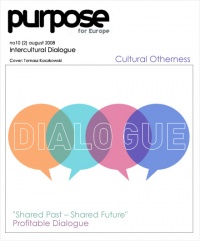
On the Margin
Cultural diversity
The project entitled “Beyond Tolerance – Youth’s Attitudes Towards Cultural Otherness” is carried out in Podlaskie Voivodeship. Who came up with the idea for the project and why is it a research project?
The idea for carrying out such a project was a result of cooperation of the local authorities of the voivodeship with academic teachers from the university in Białystok. As the local authorities, one of the reasons we decided to do a research project was to obtain material and data for further planning of educational events and activities from the realm of culture, aimed at pointing out the positive role of cultural differences.

Why young people?
The choice of the sample group for the research isn’t random. These are young people aged 19 – 24, i.e. a group which, in the nearest future, will shape and decide about the social and economic life of our country and region.
The project is subsidized by the European Union. Is it easy for local authorities to obtain EU funds?
It’s a complicated process, but there is no discrimination against a regional government.
What does it mean to you that the project is included in the framework of the EYID?
We were really pleased with the news that the year 2008 would be the EYID, partly because one of the priorities of Podlaskie Voivodeship, as regards cultural policy, is cooperation with ethnic minorities living in the region as well as providing support for their activities. What’s more, Podlaskie Voivodeship is one of the most diversified regions in terms of ethnicity and religion. For that reason we encouraged institutions and organizations from our region to apply for the funds for projects within the EYID. The three out of thirteen Polish projects that obtained the funds are the projects carried out in Podlaskie Voivodeship.
This project is an introduction to subsequent ones – which will be...?
The research results are supposed to give us the basis for further work and organization of educational activities and cultural events. What action will be undertaken and whether it’ll be necessary, we’ll learn after doing the reaserch and drawing up the report.

In the spirit of the EYID, in October, you are organizing the 4th conference of the series “It’s Worth Asking about Culture” entitled “Different – Alien – One of Us”. Could you tell us more about this project?
It’s going to be a public debate with guests from Poland and abroad, who are authorities in this field (Prof. Barbara Skarga, Prof. El¿bieta Czykwin, Prof. Magdalena ¦roda, Waldemar Janda, Brian Scott, Feliks Gawin from Grodno, Linas Vildziunas and Halina Kobeckaite from Lithuania), representatives of ethnic and religious minorities living in Podlaskie Voivodeship, cultural animators and artists as well as scholars and educators. All the participants are people for whom intercultural dialogue is the basis for their activity, and enables them to have an open attitude towards contemporary social challenges. The conference will also be an opportunity for exchanging ideas and getting together for people of different generations, who differently perceive the contemporary world and the role of intercultural dialogue. The previous three editions of the series “It’s Worth Asking about Culture” were devoted to: the 1st one – national heritage and its role in the regional development, the 2nd one – cooperation between culture animators and entrepreneurs, whereas the slogan for the 3rd one was “Human Being – Spirituality – Modernity”.
Those meetings created space for reflections and dialogue about the crucial issues related with culture, its role and place in the contemporary world; later this continued in the relations between the particular participants. Also, two titles were published which dealt with the subject matter of the conferences.
Check the archive

nr 47 September 2008
theme of the issue:
INTERCULTURAL DIALOGUE
< spis treści
Article
From the Editors
Interview
European Year of Intercultural Dialogue
Presentation
Music Found
Career in Culture
Crucible of diversity - interview with Aleksandra Halicka, The Baltic Sea Cultural Centre, Maja Ruszkowska-Mazerant
Culture Industries
Transient culture - interview with Małgorzata Bieńkowska, Maciej Mazerant
Workshop
Profitable dialogue
Young culture
"Common past - common future" - interview with Anna Mirska - Czerwińska, project coordinator
On the Margin
Cultural diversity - interview with Ms Edyta Jurkiewicz, Marshal Office of Podlaskie Voivodeship, Maja Ruszkowska-Mazerant





